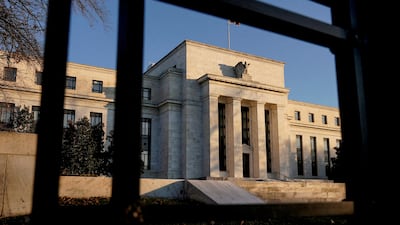A senior official at the Federal Reserve has suggested that the US central bank should consider cutting interest rates as soon as next month.
“We could do this as early as July,” Fed Governor Christopher Waller said on CNBC. “That would be my view, whether the committee would go along with it or not.”
As a governor on the Federal Reserve Board, Mr Waller holds a permanent vote on the central bank's rate-setting Federal Open Market Committee.
Mr Waller and other Fed officials unanimously voted to hold interest rates steady between 4.25 and 4.50 per cent on Wednesday. The Central Bank of the UAE, which follows Fed decisions because of the dollar peg, also held rates steady following the US central bank's decision.
Fed officials this week also maintained their forecast for two quarter-point cuts this year before slowing the pace of cuts in 2026. Several officials projected zero rate cuts, pointing to some uncertainty on the future policy path.
The central bank has not adjusted interest rates in its last four meetings, largely due to the uncertainty surrounding tariffs.
But Mr Waller said the Fed can “look through” their inflation impact, arguing tariffs would create a one-time inflation bump rather than persistent high prices.
Fed Chair Jerome Powell on Wednesday said tariffs could either have a one-off or persistent effect on inflation. Asked by reporters why not cut interest rates this month, Mr Powell said he expected to see “meaningful” inflation in the coming months.
Data shows that the Fed's preferred inflation metric has decelerated for three consecutive months. The PCE (Personal Consumption Expenditures) Price Index rose 2.1 per cent annually last month, one-tenth of a percentage point above the Fed's long-term target.

“The data the last few months has been showing that trend inflation is looking pretty good,” Mr Waller said.
He suggested that, if the Fed were to begin cutting rates in July, it should begin slowly.
“But start the process,” Mr Waller said. “That's the key thing. And then if there's some big shock due to maybe the Middle East conflict, we can pause.”
Mr Waller added that he is also concerned about the jobs market. While the unemployment rate has remained stable at around 4.2 per cent, Mr Waller said he was concerned about fewer jobs being created.
The four-week average of jobless claims is at its highest level since August 2023, according to data from the Labour Department.
“Why do we want to wait until we actually see it crash before we start cutting rates?” Mr Waller said.
“So I'm all in favour of saying maybe we should start thinking about cutting the policy rate at the next meeting, because we don't want to wait till the job market tanks before we start cutting the policy rate.”
The Fed holds its next two-day meeting from July 29 to 30.



